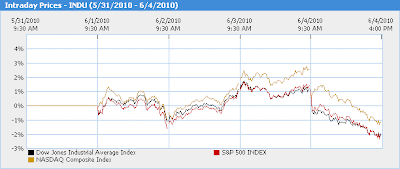Please note: Due to the 4th of July holiday next week, there will be no market commentary. Have a safe and happy holiday.
Another round of bad news sent the markets lower this week. At the Friday close, the Dow lost 2.9%, the S&P fell 3.6%, and the Nasdaq was off 3.7%. Gold hovered around its record highs, while oil popped higher on fears of a hurricane in the
Source: MSN Moneycentral
The week started out strong with news that
The biggest story of the week came on Friday with the announcement of a completed financial regulation bill. The bill is heralded as the most sweeping legislation of the banking industry since the Great Depression. In our opinion, this bill does very little, which was supported by the rise in banking stocks after the announcement. This bill does increase government control of banks and substantially increase costs, though. These costs will not be paid by the bank, however, but by the bank customers (just like corporations don’t pay taxes - the customer pays the tax in the form of higher costs). We anticipate more fees and higher costs for services, as well as a reduction in the amount credit available for lending. In the long run, we see this as harmful to bank stocks and another reason to avoid this sector.
We were disappointed by the lack of attention paid to Fannie Mae and Freddie Mac, who require substantial changes. If this bill was implemented before the financial crisis, it would not have prevented it, nor do we do not see it accomplishing anything in the future.
Unfortunately this bill was rushed through a marathon all-nighter session in order to have something to discuss at the G-20 summit. It appears to be over 2000 pages long, and no one is sure exactly what is in it. Similar to the healthcare bill, we worry what has yet to be discovered and the unintended consequences it will cause. At any rate, the bill is likely to be passed in a close vote next week.
It wasn’t all bad news last week. Both consumer sentiment and current economic conditions climbed to the highest level in over two years. Additionally, a report on corporate profits showed a significant gain. Frankly, businesses appear to be performing relatively well. The crisis has forced companies to become leaner and meaner, and we think they are better prepared for a potentially rocky future. The greatest risks and worries we see are politically related, as policy mistakes, both here and abroad, have been the driving factor of the markets recently.
Next Week
Next week looks to be a busy one. As the week progresses, we will receive personal income and spending reports, consumer confidence, Case-Schiller home price index, manufacturing, and most importantly on Friday, the June unemployment rate. Any surprises with these will certainly impact the market.
The G-20 summit kicks into full gear next week, as well. The message from the
Where are we investing now?
With the volatility of the last couple weeks and months, we still believe a simple ladder of corporate bonds and bond funds looks like the least-scary investment. For a long term horizon, some values in stocks can be found, although we remain cautious. Our big-picture outlook still remains the same, as we are optimistic through the end of the year with the low interest rates and stimulus funds pushing the markets higher. The higher interest rates, higher taxes, increasing government involvement in the private sector, and a still-high unemployment rate have us worried for the longer term.
In equities, we are focused on higher-quality and multi-national stocks, but some smaller stocks look promising, as well. We continue to avoid banking and insurance sector stocks, and new government regulations have us staying out of oil companies. TIPs are important as we expect inflation to increase in the future, while




